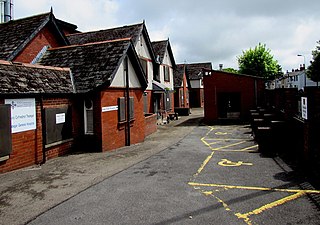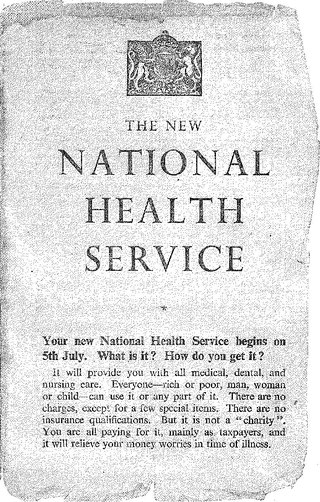Related Research Articles

Aneurin "Nye" Bevan PC was a Welsh Labour Party politician, noted for tenure as Minister of Health in Clement Attlee's government in which he spearheaded the creation of the British National Health Service. He is also known for his wider contribution to the founding of the British welfare state. He was first elected as MP for Ebbw Vale in 1929, and used his Parliamentary platform to make a number of influential criticisms of Winston Churchill and his government during the Second World War. Before entering Parliament, Bevan was involved in miners' union politics and was a leading figure in the 1926 general strike. Bevan is widely regarded as one of the most influential left-wing politicians in British history.
General practice is the name given in various nations, such as the United Kingdom, India, Australia, New Zealand and South Africa to the services provided by general practitioners. In some nations, such as the US, similar services may be described as family medicine or primary care. The term Primary Care in the UK may also include services provided by community pharmacy, optometrist, dental surgery and community hearing care providers. The balance of care between primary care and secondary care - which usually refers to hospital based services - varies from place to place, and with time. In many countries there are initiatives to move services out of hospitals into the community, in the expectation that this will save money and be more convenient.
The British Medical Association (BMA) is a registered trade union for doctors in the United Kingdom. The association does not regulate or certify doctors, a responsibility which lies with the General Medical Council. The association's headquarters are in Tavistock Square, London and it has national offices in Cardiff, Belfast, and Edinburgh, a European office in Brussels and a number of offices in English regions. The BMA has a range of representative and scientific committees and is recognised by National Health Service (NHS) employers alongside the Hospital Consultants and Specialists Association as one of two national contract negotiators for doctors.

The Royal College of General Practitioners (RCGP) is the professional body for general (medical) practitioners in the United Kingdom. The RCGP represents and supports GPs on key issues including licensing, education, training, research and clinical standards. It is the largest of the medical royal colleges, with over 50,000 members. The RCGP was founded in 1952 in London, England and is a registered charity. Its motto is Cum Scientia Caritas – "Compassion [empowered] with Knowledge."

The Socialist Health Association is a socialist medical association based in the United Kingdom. It is affiliated to the Labour Party as a socialist society.
General medical services (GMS) is the range of healthcare that is provided by general practitioners as part of the National Health Service in the United Kingdom. The NHS specifies what GPs, as independent contractors, are expected to do and provides funding for this work through arrangements known as the General Medical Services Contract. Today, the GMS contract is a UK-wide arrangement with minor differences negotiated by each of the four UK health departments. In 2013 60% of practices had a GMS contract as their principle contract. The contract has sub-sections and not all are compulsory. The other forms of contract are the Personal Medical Services or Alternative Provider Medical Services contracts. They are designed to encourage practices to offer services over and above the standard contract. Alternative Provider Medical Services contracts, unlike the other contracts, can be awarded to anyone, not just GPs, don't specify standard essential services, and are time limited. A new contract is issued each year.

NHS Scotland, sometimes styled NHSScotland, is the publicly funded healthcare system in Scotland and one of the four systems that make up the National Health Service in the United Kingdom. It operates 14 territorial NHS boards across Scotland, supported by seven special non-geographic health boards, and Public Health Scotland.

Tredegar General Hospital was a community hospital in Tredegar, Blaenau Gwent, Wales. It was managed by the Aneurin Bevan Local Health Board.

The National Health Service (NHS) is the publicly funded healthcare system in England, and one of the four National Health Service systems in the United Kingdom. It is the second largest single-payer healthcare system in the world after the Brazilian Sistema Único de Saúde. Primarily funded by the government from general taxation, and overseen by the Department of Health and Social Care, the NHS provides healthcare to all legal English residents and residents from other regions of the UK, with most services free at the point of use for most people. The NHS also conducts research through the National Institute for Health and Care Research (NIHR).

Healthcare in Wales is mainly provided by the Welsh public health service, NHS Wales. NHS Wales provides healthcare to all permanent residents that is free at the point of need and paid for from general taxation. Health is a matter that is devolved, and considerable differences are now developing between the public healthcare systems in the different countries of the United Kingdom, collectively the National Health Service (NHS). Though the public system dominates healthcare provision, private health care and a wide variety of alternative and complementary treatments are available for those willing to pay.

The National Health Service (NHS) is the conglomerate name for the publicly funded healthcare systems of the United Kingdom, comprising NHS England, NHS Scotland and NHS Wales. Health and Social Care in Northern Ireland was created separately and is often locally referred to as "the NHS". The original three systems were established in 1948 as part of major social reforms following the Second World War. The founding principles were that services should be comprehensive, universal and free at the point of delivery—a health service based on clinical need, not ability to pay. Each service provides a comprehensive range of health services, provided without charge for people ordinarily resident in the United Kingdom apart from dental treatment and optical care. In England, NHS patients have to pay prescription charges; some, such as those aged over 60, or those on certain state benefits, are exempt.
Doctors in Unite is a trade union for doctors in the United Kingdom. It was formerly known as the Medical Practitioners' Union (MPU) before its affiliation with Unite.

The National Health Service in England was created by the National Health Service Act 1946. Responsibility for the NHS in Wales was passed to the Secretary of State for Wales in 1969, leaving the Secretary of State for Social Services responsible for the NHS in England by itself.

Tredegar Medical Aid Society was founded in Tredegar in South Wales. In return for contributions from its members it provided health care free at the point of use. This society contributed the model which established the British National Health Service. According to Colin Ward, the model had "evolved from the vast network of friendly societies and mutual aid organisations that had sprung up through working class self-help in the 19th century."

The Health and Social Care Act 2012 is an act of the Parliament of the United Kingdom. It provided for the most extensive reorganisation of the structure of the National Health Service in England to date. It removed responsibility for the health of citizens from the Secretary of State for Health, which the post had carried since the inception of the NHS in 1948. It abolished primary care trusts (PCTs) and strategic health authorities (SHAs) and transferred between £60 billion and £80 billion of "commissioning", or healthcare funds, from the abolished PCTs to several hundred clinical commissioning groups, partly run by the general practitioners (GPs) in England. A new executive agency of the Department of Health, Public Health England, was established under the act on 1 April 2013.

Trafford General Hospital is a district general hospital in Davyhulme, Greater Manchester, England, managed by Manchester University NHS Foundation Trust.
The Enquiry into the Cost of the National Health Service, known popularly as the Guillebaud Report, was a 1956 report of the Government of the United Kingdom into the financial efficiency of the National Health Service. The chair of the independent Committee of Enquiry, and lead author of the report, was the Cambridge economist C. W. Guillebaud.
Out-of-hours services are the arrangements to provide access to healthcare at times when General Practitioner surgeries are closed; in the United Kingdom this is normally between 6.30pm and 8am, at weekends, at Bank Holidays and sometimes if the practice is closed for educational sessions.
The 2015 Queen's Birthday Honours are appointments by some of the 16 Commonwealth realms of Queen Elizabeth II to various orders and honours to reward and highlight good works by citizens of those countries. The Birthday Honours are awarded as part of the Queen's Official Birthday celebrations during the month of June. The Queen's Birthday Honours were announced on 1 June 2015 in New Zealand, on 8 June in Australia, and on 12 June in the United Kingdom, in Grenada, Papua New Guinea, Solomon Islands, Tuvalu, Saint Lucia and Belize.

David Wrigley is a British medical doctor who works as a general practitioner (GP) in Lancashire and is the deputy chair of the British Medical Association (BMA) Council. He is a member of the Labour Party and Socialist Health Association.
References
- ↑ Mr Aneurin Bevan on the NHS History website.
- ↑ Danckwert's Award on Hansard.
- ↑ The History Page on the Claire Wand Fund website.